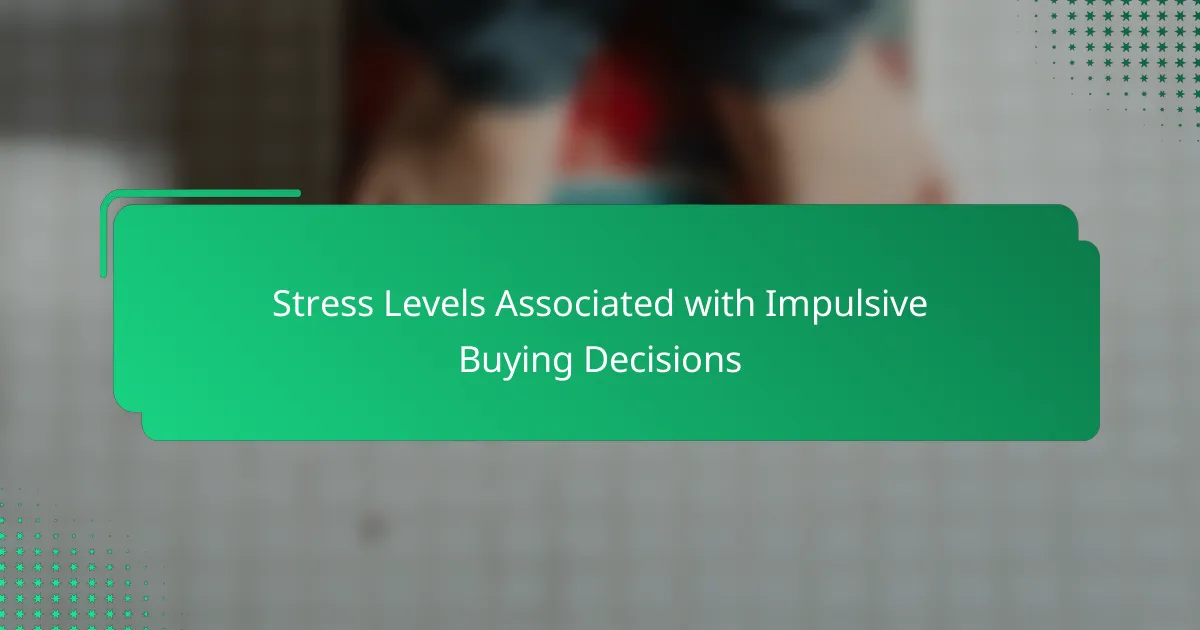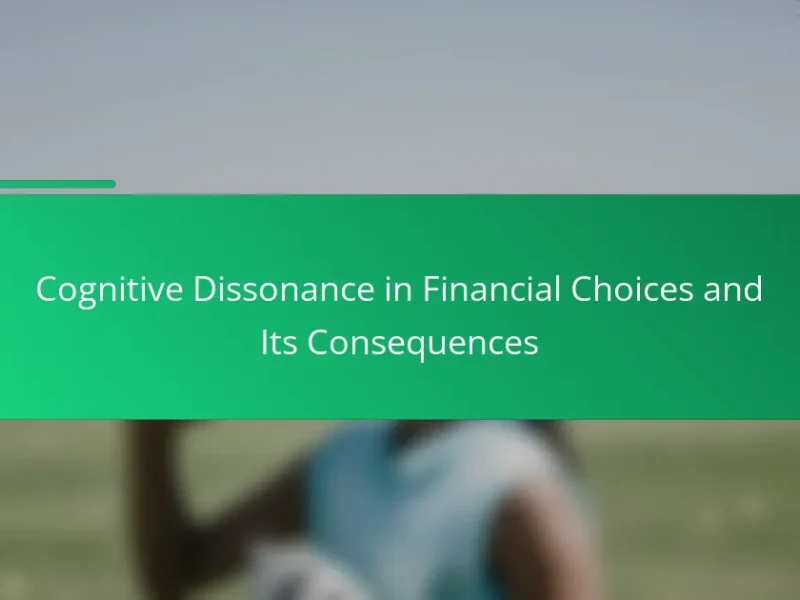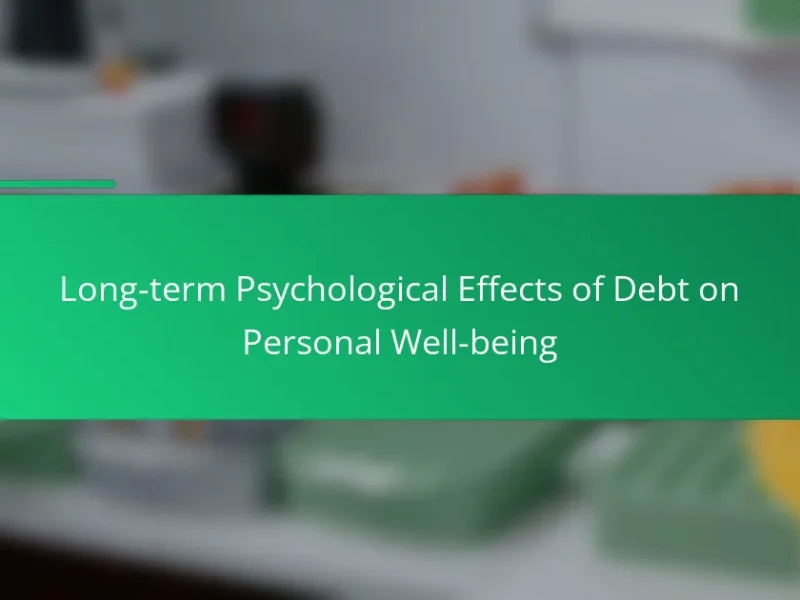High stress levels can lead to impulsive buying decisions, often as a coping mechanism for emotional relief. This article explores how stress triggers impulsivity, the emotional and social factors influencing spending, and effective strategies to manage stress-related purchasing behaviours. Understanding these dynamics can help individuals develop healthier financial habits and emotional resilience.
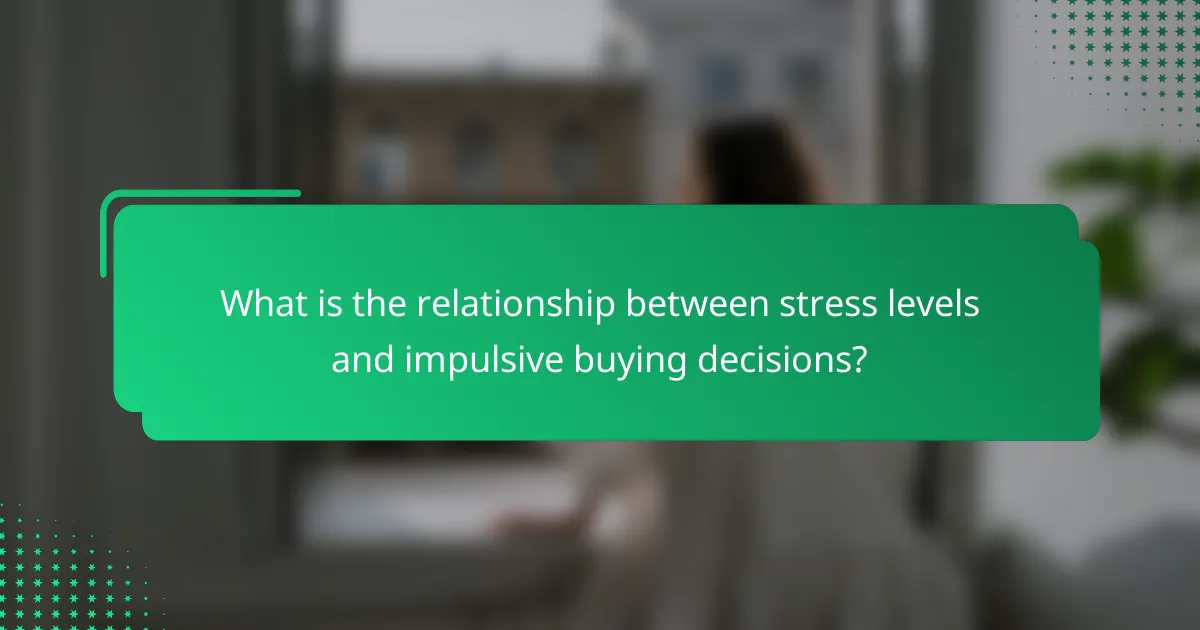
What is the relationship between stress levels and impulsive buying decisions?
Stress levels significantly influence impulsive buying decisions. High stress can lead to emotional spending as individuals seek immediate relief or comfort. Research indicates that stress triggers impulsivity, leading consumers to make unplanned purchases to alleviate negative feelings. This behaviour often results in buyer’s remorse, highlighting the negative consequences of stress-induced spending. Understanding this relationship can help individuals develop healthier coping mechanisms and financial habits.
How does stress influence consumer behaviour?
Stress significantly drives impulsive buying decisions. High stress levels often lead to emotional spending as consumers seek instant gratification. Research indicates that stress can impair decision-making, making individuals more likely to make unplanned purchases. This behaviour serves as a coping mechanism, providing temporary relief from stress. Moreover, impulsive buying can lead to regret, creating a cycle of stress and spending. Understanding this relationship can help brands tailor marketing strategies to address consumer needs during high-stress periods.
What psychological factors contribute to impulsive buying during stressful times?
Stress levels significantly influence impulsive buying decisions. High stress often triggers emotional responses that lead to unplanned purchases as a coping mechanism. Research indicates that individuals under stress may seek instant gratification through shopping to alleviate negative feelings. This behaviour can be exacerbated by marketing tactics that exploit emotional vulnerability during difficult times. Moreover, the unique attribute of impulsive buying during stress is the tendency to prioritise short-term relief over long-term financial goals. Understanding these psychological factors can help consumers make more mindful choices, particularly in challenging periods.
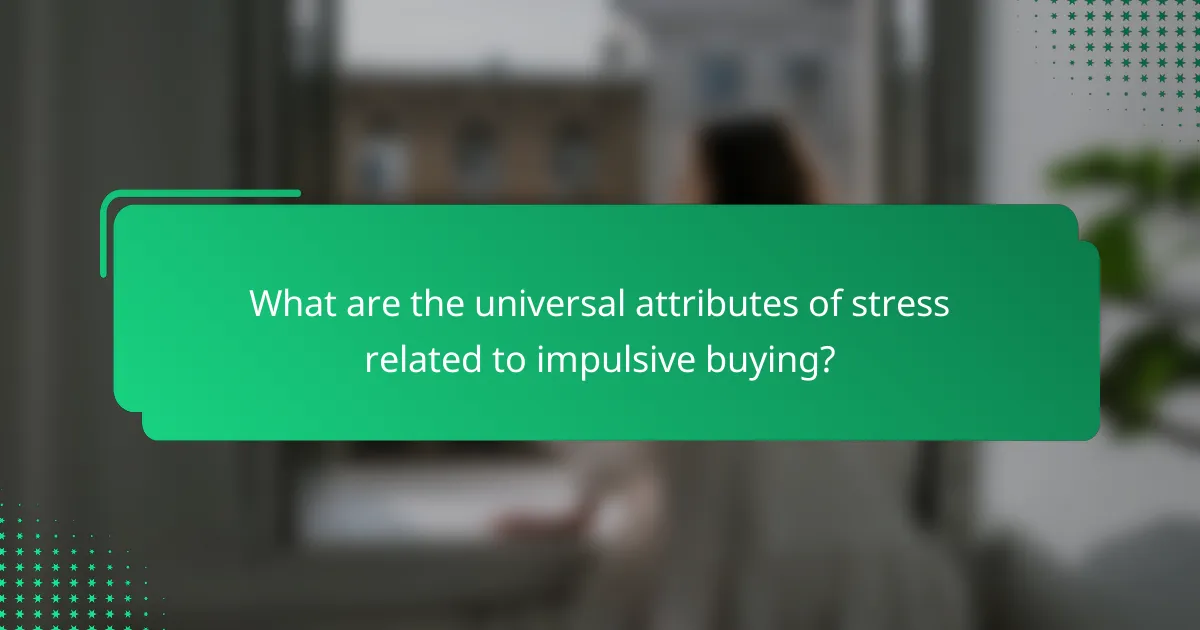
What are the universal attributes of stress related to impulsive buying?
Stress levels significantly influence impulsive buying decisions. High stress can trigger emotional responses, leading to unplanned purchases as a coping mechanism. Impulsive buying often serves as a temporary escape from stressors, creating a cycle of regret and further stress. Research indicates that individuals under stress are more likely to make irrational spending choices, driven by the desire for immediate gratification. This relationship between stress and impulsive buying highlights the need for effective stress management strategies to mitigate impulsive behaviours.
How do emotional triggers lead to impulsive purchases?
Emotional triggers significantly influence impulsive buying decisions by heightening stress levels. High stress can lead to a desire for immediate relief, often found in shopping. This behaviour is linked to the release of dopamine, which provides a temporary sense of pleasure. Research indicates that individuals experiencing stress are more likely to make unplanned purchases, often resulting in buyer’s remorse. Understanding this connection can help consumers manage their spending habits more effectively.
What role does financial stress play in impulsive buying?
Financial stress significantly increases the likelihood of impulsive buying decisions. Individuals facing financial difficulties often seek immediate gratification through purchases, leading to unplanned spending. Research indicates that heightened stress levels can impair judgement, making it harder to resist temptation. This behaviour can create a cycle of debt and further financial strain, exacerbating stress. Understanding this relationship is crucial for developing effective financial management strategies.
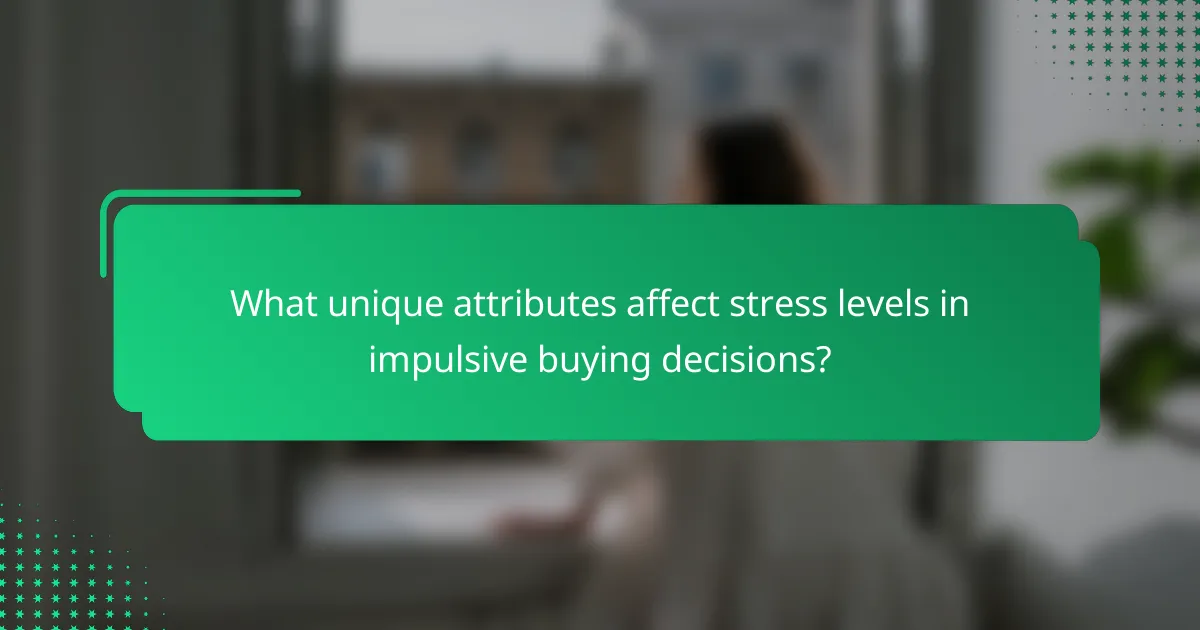
What unique attributes affect stress levels in impulsive buying decisions?
Stress levels in impulsive buying decisions are influenced by unique attributes such as emotional triggers, financial literacy, and social pressure. Emotional triggers include feelings of anxiety or sadness that lead to impulsive purchases as a coping mechanism. Financial literacy affects decision-making; those with lower financial awareness may experience heightened stress when making unplanned purchases. Social pressure can amplify stress, as individuals may feel compelled to buy to fit in or impress others. Understanding these unique attributes can help mitigate stress related to impulsive buying behaviours.
How do personality traits impact impulsive buying behaviour under stress?
Personality traits significantly influence impulsive buying behaviour during stress. Individuals with high neuroticism often exhibit increased impulsivity, leading to unplanned purchases as a coping mechanism. Conversely, those with higher conscientiousness tend to resist impulsive buying, focusing on long-term goals. Stress triggers emotional responses, which can amplify impulsive buying tendencies, particularly in individuals lacking self-control. Understanding these dynamics can help in developing strategies to mitigate impulsive buying under stress.
What unique situational factors increase impulsive buying during high-stress periods?
High-stress periods can significantly increase impulsive buying due to emotional responses and coping mechanisms. Factors such as heightened anxiety, limited self-control, and the desire for instant gratification drive individuals to make spontaneous purchases. Stress often leads to a unique attribute where individuals seek comfort through shopping, viewing it as a temporary relief. Additionally, marketing strategies exploiting this stress can create a rare attribute, enticing consumers with promotions that appeal to their emotional state.
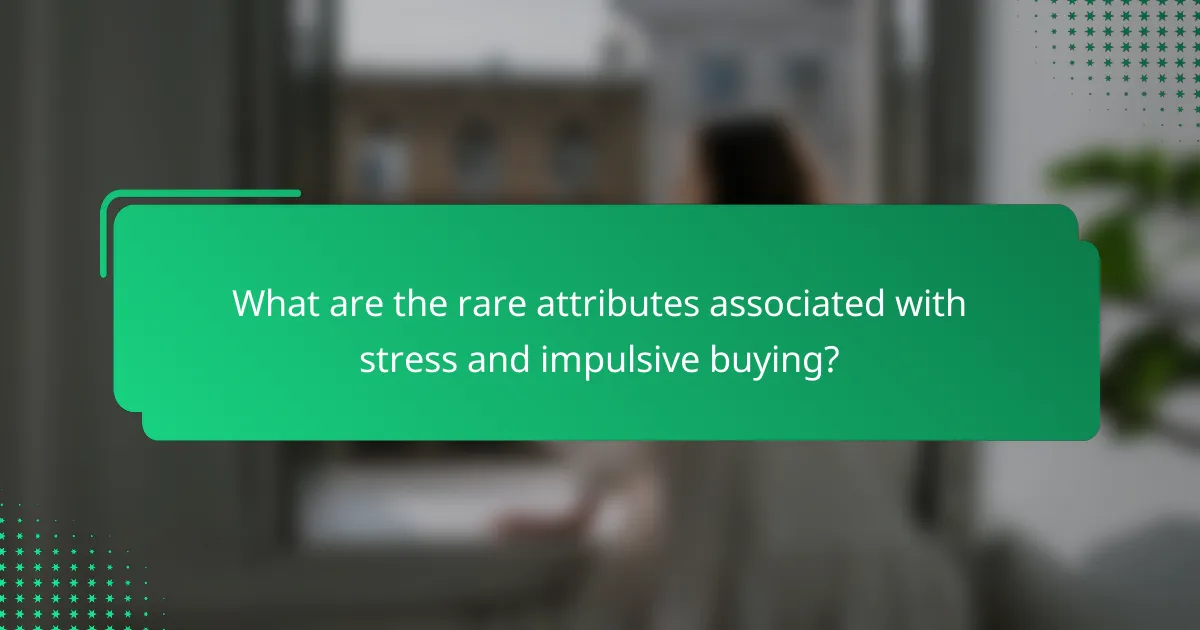
What are the rare attributes associated with stress and impulsive buying?
Rare attributes associated with stress and impulsive buying include emotional triggers, such as heightened anxiety leading to compulsive purchases, and situational factors like social pressure that amplify spending behaviour. Additionally, some individuals may experience unique cognitive distortions, such as a belief that shopping alleviates stress, which is less common among the general population.
How do cultural differences influence stress-related impulsive buying?
Cultural differences significantly influence stress-related impulsive buying behaviours. For instance, cultures that prioritise individualism may see higher impulsive buying during stress due to personal coping mechanisms. In contrast, collectivist cultures might exhibit restraint, focusing on group harmony and shared values. Stress levels can amplify impulsive buying tendencies, with studies showing that emotional distress often leads to unplanned purchases. The unique attribute of cultural context shapes how individuals respond to stress, impacting their buying decisions. Understanding these dynamics can enhance marketing strategies and consumer support systems across diverse cultural landscapes.
What infrequent triggers can lead to impulsive buying during extreme stress?
Infrequent triggers that can lead to impulsive buying during extreme stress include emotional exhaustion, sudden life changes, social pressure, and limited coping mechanisms. Emotional exhaustion can diminish self-control, making individuals more susceptible to impulsive purchases. Sudden life changes, such as job loss or relationship breakdowns, may prompt unplanned spending as a coping strategy. Social pressure can arise from peer comparisons, leading to impulsive buying to fit in. Limited coping mechanisms may result in seeking immediate gratification through purchases to alleviate stress temporarily.
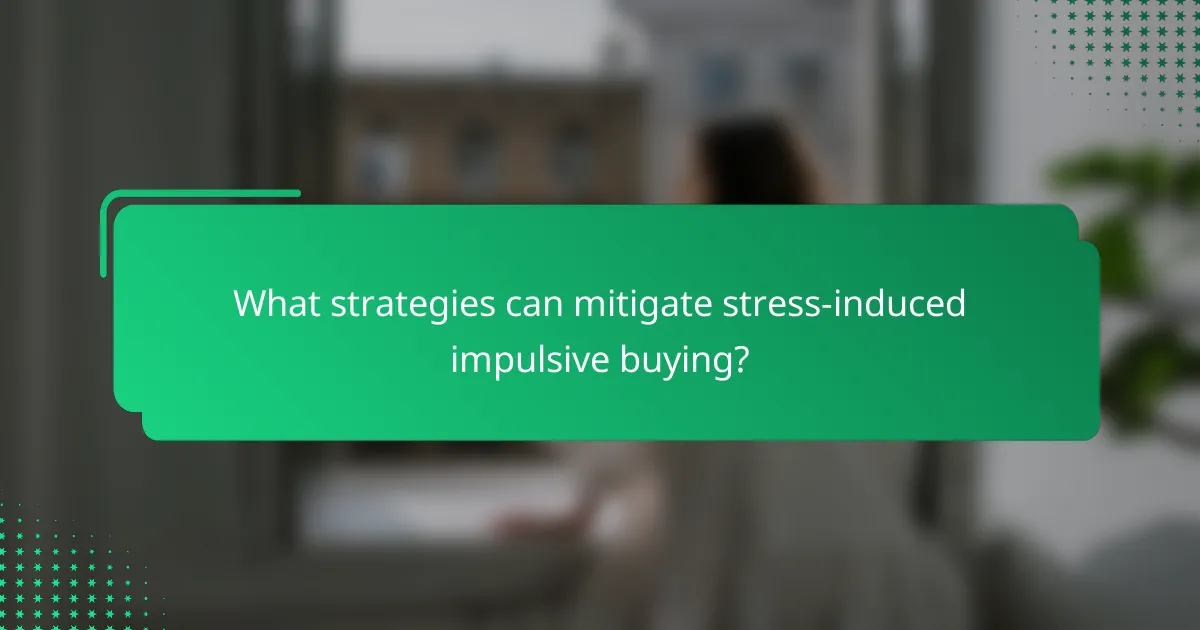
What strategies can mitigate stress-induced impulsive buying?
To mitigate stress-induced impulsive buying, individuals can adopt several effective strategies. First, practising mindfulness can help increase awareness of emotional triggers. Second, setting a budget limits spending and encourages thoughtful purchases. Third, engaging in alternative stress-relief activities, such as exercise or hobbies, can redirect focus. Fourth, seeking social support provides emotional reinforcement and accountability. Lastly, utilising a shopping list reduces impulse by prioritising planned purchases. These strategies collectively address the root cause of impulsive buying linked to stress.
What practical tips can help consumers manage stress before shopping?
To manage stress before shopping, consumers can adopt several practical strategies. First, set a budget to limit impulsive spending. Second, create a shopping list to stay focused and avoid distractions. Third, practise mindfulness techniques such as deep breathing to calm nerves. Fourth, consider shopping during off-peak hours to reduce crowd-related anxiety. Lastly, take breaks if feeling overwhelmed to regain composure.
How can budgeting techniques reduce impulsive purchases?
Budgeting techniques can significantly reduce impulsive purchases by promoting mindful spending. By setting clear financial goals and tracking expenses, individuals can become more aware of their spending habits. This awareness lowers stress levels associated with impulsive buying decisions. Techniques such as the envelope system or zero-based budgeting encourage prioritising needs over wants. As a result, individuals are less likely to make spontaneous purchases that lead to financial strain. Implementing these techniques fosters discipline and enhances overall financial well-being.
What role does mindfulness play in controlling impulsive buying?
Mindfulness plays a crucial role in controlling impulsive buying by reducing stress levels associated with decision-making. Practising mindfulness helps individuals recognise triggers that lead to impulsive purchases, allowing for better emotional regulation. Studies show that mindfulness can decrease anxiety, which is often linked to impulsive buying behaviour. By fostering awareness of thoughts and feelings, mindfulness encourages more deliberate and thoughtful spending choices. This shift in mindset can lead to improved financial well-being and reduced buyer’s remorse.
What common mistakes should consumers avoid when shopping under stress?
Consumers should avoid making impulsive buying decisions during stressful times. Stress can cloud judgement, leading to unnecessary purchases.
Common mistakes include not setting a budget, ignoring product quality, and failing to compare prices. Impulsive buying often results in buyer’s remorse, which can heighten stress levels. Additionally, shopping while stressed may lead to prioritising immediate gratification over long-term satisfaction.
To mitigate these mistakes, consumers should take breaks, practise mindfulness, and create a shopping list before heading out. These strategies help maintain focus and reduce the influence of stress on decision-making.
How can awareness of stress levels improve purchasing decisions?
Awareness of stress levels can significantly enhance purchasing decisions by promoting more thoughtful choices. Recognising stress triggers helps individuals avoid impulsive buying, which often leads to regret and financial strain. Studies indicate that high stress correlates with increased impulsivity, making consumers more likely to make unnecessary purchases. By monitoring stress, consumers can pause and reflect, allowing them to evaluate needs versus wants. This mindful approach fosters better budgeting and long-term satisfaction with purchases.
